Plastic bullets were fired and water cannons were used as rioting erupted again in Belfast on January 12 at loyalist flag protests, Irish Republican News said that day.
Belfast has been hit by violent protests and riots in the aftermath of a decision by Belfast City Council to restrict the flying of the Union Jack at Belfast City Hall to 17 days a year.
-
-
Thousands of people marched through Dublin on November 17 to protest against the death of dentist Savita Halappanavar, who died of blood poisoning after being refused an abortion. More than 10,000 people gathered for a vigil and march over the death and the country's draconian abortion laws. A minute's silence was held at Merrion Square by the crowd, followed by chants of “never again”. Irish doctors appear to have judged that leaving Ms Halappanavar for two days with a fully opened cervix did not present any risk of the infection from which she eventually died.
-
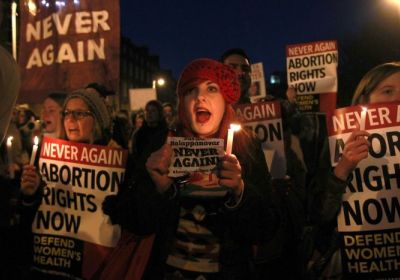 Thousands of people marched to the offices of Ireland's prime minister on November 17 to support a woman's right to choose. The protest was sparked by the death of Savita Halappanavar in hospital, after staff refused to terminate her pregnancy even though her life was in danger. The article below first appeared on the Irish site Sráid Marx. * * *
Thousands of people marched to the offices of Ireland's prime minister on November 17 to support a woman's right to choose. The protest was sparked by the death of Savita Halappanavar in hospital, after staff refused to terminate her pregnancy even though her life was in danger. The article below first appeared on the Irish site Sráid Marx. * * * -
Trouble flared across Ireland's north on the night of July 12 as sectarian Orange Order marchers insisted on marching through nationalist areas, the Morning Star said the next day. It said serious rioting followed a unionist (supporters of Northern Ireland's union with Britain) parade through the the largely Catholic and Irish nationalist working-class suburb of Ardoyne in north Belfast.
-
The Irish government successfully bullied a majority of those who turned out for the May 31 referendum into voting “yes” to changing the constitution to allow the government to ratify the European Union's pro-austerity Fiscal Treaty. But it would be a mistake to read it as a ringing endorsement for their austerity policies. Many of those who voted did so with a gun to their head and no enthusiasm for the policies contained in the treaty. After all the blackmail and bullying, the Yes side could only manage a 60% Yes vote with a 50% turnout.
-
Sinn Fein President Gerry Adams led a dramatic walkout from the Dublin parliament (Dail) on November 2. The protest was over the coalition government’s decision to hand over more than €700 million to an unknown private investor in the failed Anglo Irish Bank. Finance minister Michael Noonan admitted in the Dail there was no legal obligation to refund the bond investment, which was not covered by the former government’s bank guarantee. With the government refusing a debate on the matter, Adams led the walkout of Sinn Fein and United Left Alliance parliamentarians.
-
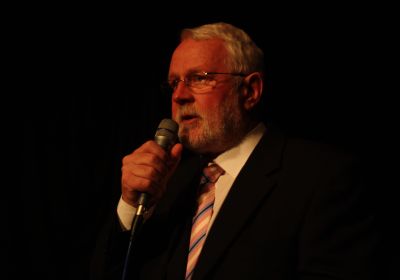 Martin Ferris, Sinn Fein TD (member of the Dublin-based parliament, the Dail) for Kerry, visited Australia at the end of July. Ferris spoke to hundreds of people at public meetings in Perth, Sydney and Melbourne on the economic crisis in Ireland. He also spoke on the struggle to reunify the six counties in Ireland's north still controlled by Britain with the 26 counties that make up the southern state.
Martin Ferris, Sinn Fein TD (member of the Dublin-based parliament, the Dail) for Kerry, visited Australia at the end of July. Ferris spoke to hundreds of people at public meetings in Perth, Sydney and Melbourne on the economic crisis in Ireland. He also spoke on the struggle to reunify the six counties in Ireland's north still controlled by Britain with the 26 counties that make up the southern state. -
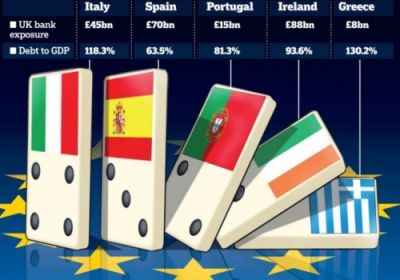
The euro will survive for now — but only because working people in Greece and other European countries face greater suffering. That’s the not-so-hidden agenda behind the new US$227 billion bailout of Greece organised by the most powerful countries of the European Union, mainly France and Germany.
-
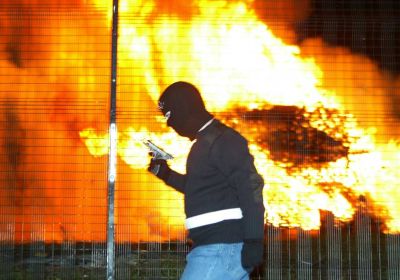 More than 100 loyalists (supporters of British rule) were involved in a serious mob assault at a “peaceline” in the mid-Ulster town of Portadown in Northern Ireland on July 15, throwing bricks, bottles, paint-bombs, fireworks and at least one blast bomb. The mid-Ulster Ulster Volunteer Force (UVF) has been widely blamed for the assault, the latest in a series of large-scale attacks it has mounted over the “marching season” (when the Protestant Orange Order holds provocative anti-Catholic marches).
More than 100 loyalists (supporters of British rule) were involved in a serious mob assault at a “peaceline” in the mid-Ulster town of Portadown in Northern Ireland on July 15, throwing bricks, bottles, paint-bombs, fireworks and at least one blast bomb. The mid-Ulster Ulster Volunteer Force (UVF) has been widely blamed for the assault, the latest in a series of large-scale attacks it has mounted over the “marching season” (when the Protestant Orange Order holds provocative anti-Catholic marches). -
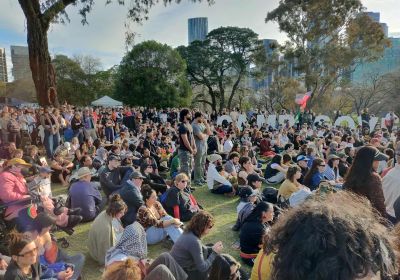
About 1000 people took part in the Enough Campaign's protest against European Union/International Monetary Fund austerity program in Dublin on July 16.
-
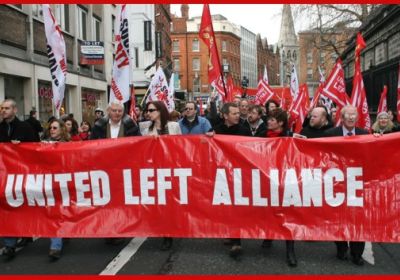 Ireland’s seven-month-old United Left Alliance (ULA) is the “new kid on the block” of European anti-capitalist parties. Launched in November last year, it won five TDs (members of the Irish parliament, the Dail) in February elections, despite its name not appearing on the ballot paper. To date the ULA has also won 20 positions in local councils and one seat in the European parliament. In the Dail, the ULA TDs have already had successes, such as stopping the abolition of the Joint Labour Committees that set wages and conditions in some industries.
Ireland’s seven-month-old United Left Alliance (ULA) is the “new kid on the block” of European anti-capitalist parties. Launched in November last year, it won five TDs (members of the Irish parliament, the Dail) in February elections, despite its name not appearing on the ballot paper. To date the ULA has also won 20 positions in local councils and one seat in the European parliament. In the Dail, the ULA TDs have already had successes, such as stopping the abolition of the Joint Labour Committees that set wages and conditions in some industries. -
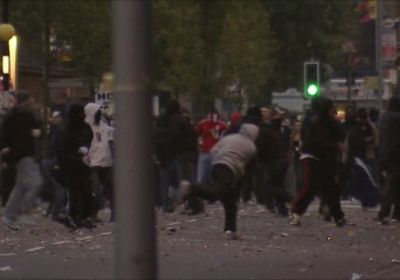
Violent attacks and rioting, orchestrated by terrorist Ulster Volunteer Force (UVF), have targeted communities of the Catholic minority in Northern Ireland in recent weeks.